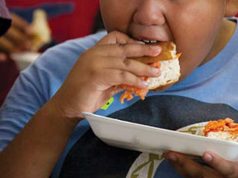

Working mothers who are helping to lighten the family’s financial load may find preparing nutritious meals for the family a little overwhelming after a hard day at work.
This is despite acknowledging the importance of a good diet in aiding their children’s growth.
Good nutrition is an often overlooked aspect of children’s well-being, yet it is a matter that very much deserves attention.
This is because the health of children today is fast reaching a worrying state.
RISE IN OBESITY
Statistics on public health have revealed an alarming rise in obesity cases among children.
The South East Asian Nutrition Survey (SEANUTS) found that one in every 20 children is underweight while one in five is overweight or obese.
“In general, children in this country carry the burden of dual malnutrition.
“However, the more common of the two is overeating, a problem that calls for everyone’s serious attention, particularly the parents”, said Prof Dr Poh Bee Koon, Head of Universiti Kebangsaan Malaysia’s Nutritional Sciences Programme. SEANUTS is the largest and most extensive nutrition and health study ever done in Southeast Asia.
She spoke while presenting the results of the survey at the regional conference “Bringing Health and Nutrition Back to Malaysian Children” function.
The study was a joint effort between FrieslandCampina and four international universities from Malaysia, Indonesia, Vietnam and Thailand.
A total of 16,744 children were studied in the survey, 3,542 of whom were Malaysians from rural and city areas.
A GLOBAL PROBLEM
The recently-concluded SEANUTS study support the findings of previous studies of similar nature.
The World Health Organisation (WHO) for example has predicted that by the 21st century, child obesity would be a concern not only among developed nations but in developing countries as well.
Asian countries are not spared as WHO statistic show that the number of overweight preschool children in such nations would increase by 4.9 per cent by 2020 compared with 3.2 percent in 1990.
Health Minister Datuk Seri Dr S. Subramaniam was quoted as saying that the country’s health records show the obesity rate in 2011 was 59.1 per cent, a 15.1 percent increase from 44.4 per cent in 1996.
Furthermore, obesity is the gateway to chronic illnesses like kidney disease, hypertension, heart attack and stroke. Obese children are also more prone to feelings of low self-esteem and related psychological issues.
PARENTAL INFLUENCE
It cannot be denied that children today are exposed to a number of environmental factors that influence their eating habits.
However, their parents still have a significant role to play.
Parents can shape dietary habits and educate their children on the importance of good nutrition from an early age.
They should also set a good example by practicing good dietary habits themselves.
Consultant Paediatrician Dr Zulkifli Ismail was quoted as saying that the rising cases of child obesity could be attributed to the dietary habits of their parents.
It is estimated that some 40 per cent of obesity cases among children were due to parental lifestyle choices such as taking the children to eat out at night.
He said exacerbating the situation was the proliferation of 24-hour stalls and fast food restaurants across the country in recent years.
Meanwhile Dr Poh added that as the country’s economy progresses, the people could afford to buy more but it is hoped that they would buy more good food.
However, it is not usually the case.
CRITICAL STAGE
When children are exposed to an unbalanced diet from a young age, they will learn to accept it as a norm and make it into a habit for life.
Some parents also feel no need to put their foot down when their children make bad dietary choices, choosing instead to take the easy way out by letting the children decide for themselves.
What they do not realise is that childhood is a critical stage during which good or bad eating habits are formed.
An inclination towards food high in calories, fat, sodium and sugar can contribute to health problems in the long run.
A study by the University of Minnesota School of Public Health and the National University of Singapore revealed that people who ate fast food four times a week faced 80 percent risk of dying from coronary heart disease.
“All of these studies show that parental involvement in the matter is imperative in ensuring better health among children,” said Dr Poh.
– BERNAMA










